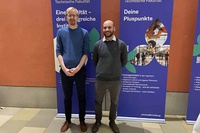Soft robotics and sensor technology
Due to their appointment to the Faculty of Engineering, JProf. Dr. Edoardo Milana, Tenure-Track Professor of Soft Machines, and JProf. Dr. Alwin Daus, Tenure-Track Professor of Sensors, invited guests to the large lecture hall of the Faculty of Engineering at the University of Freiburg. On this festive occasion, they presented their previous research successes and future plans.
The inaugural lecture was attended by numerous employees and colleagues from various faculties as well as the Dean of the Faculty of Engineering, Prof. Dr. Frank Balle, and the Deputy Director of the Department of Microsystems Engineering, Prof. Dr. Moritz Diehl.
In his presentation "Soft Robotics - The rise of gentle machines", Milana showed the advantages of bio-inspired soft robotic systems made of deformable and adaptive materials compared to rigid robots as we know them from industry, for example. In his research, Milana investigates the physical control of soft robots, multifunctional soft structures and multimodal robots as well as the miniaturization of soft robotic systems. As part of his future projects in the DFG Cluster of Excellence LivMats, Milana will continue his research into using the non-linear mechanical behavior of soft structures and metamaterials to embed functionality in soft robots so that these soft machines with their technical material properties can interact intelligently with their environment.
In his presentation "Device and Materials Engineering for flexible IoT Sensor Systems", Daus introduced the use of thin-film semiconductor materials that can be incorporated into components using low-temperature processes. His research focuses on material and device development for various Internet of Things applications, e.g. neuro-implants, biomedical diagnostics, flexible touchscreens and food packaging. In the future, Daus will work on projects in which neuromorphic systems with artificial synapses and neurons are developed on a chip. These systems will also contain flexible synaptic sensors that can be used in sensor arrays and thus offer potential applications for learning neuromorphic systems. Daus is also working on making his material technologies more sustainable by reducing the proportion of rare elements.
After the two lectures, all participants were able to meet in person in the foyer of building 101 and continued the conversation over a drink and buffet.
Contact:
JProf. Alwin Daus
University of Freiburg
Department of Microsystems Engineering – IMTEK
Sensors
E-Mail: alwin.daus@imtek.uni-freiburg.de
JProf. Dr. Edoardo Milana
University of Freiburg
Department of Microsystems Engineering – IMTEK
Soft Machines
E-Mail: edoardo.milana@imtek.uni-freiburg.de
Kerstin Steiger-Merx
Representative PR/Marketing
Faculty of Engineering
University of Freiburg
Tel.: 0761/203-8056
E-Mail: steiger-merx@tf.uni-freiburg.de

